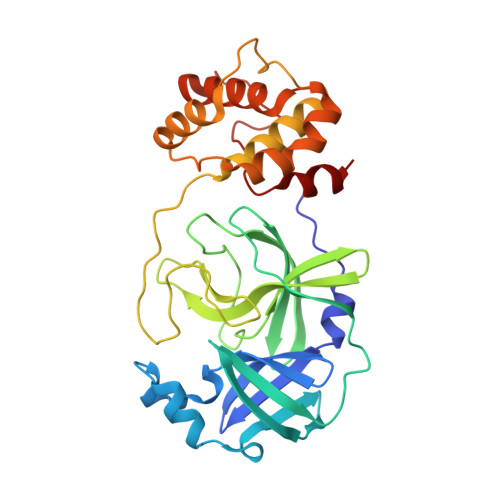Structural Basis for the Inhibition of Coronaviral Main Proteases by a Benzothiazole-Based Inhibitor.
Hu, X., Lin, C., Xu, Q., Zhou, X., Zeng, P., McCormick, P.J., Jiang, H., Li, J., Zhang, J.(2022) Viruses 14
- PubMed: 36146880
- DOI: https://doi.org/10.3390/v14092075
- Primary Citation of Related Structures:
7XRS, 7XRY, 7YGQ - PubMed Abstract:
The ongoing spread of severe acute respiratory syndrome coronavirus-2 (SARS-CoV-2) has caused hundreds of millions of cases and millions of victims worldwide with serious consequences to global health and economies. Although many vaccines protecting against SARS-CoV-2 are currently available, constantly emerging new variants necessitate the development of alternative strategies for prevention and treatment of COVID-19. Inhibitors that target the main protease (M pro ) of SARS-CoV-2, an essential enzyme that promotes viral maturation, represent a key class of antivirals. Here, we showed that a peptidomimetic compound with benzothiazolyl ketone as warhead, YH-53, is an effective inhibitor of SARS-CoV-2, SARS-CoV, and MERS-CoV M pro s. Crystal structures of M pro s from SARS-CoV-2, SARS-CoV, and MERS-CoV bound to the inhibitor YH-53 revealed a unique ligand-binding site, which provides new insights into the mechanism of inhibition of viral replication. A detailed analysis of these crystal structures defined the key molecular determinants required for inhibition and illustrate the binding mode of M pro s from other coronaviruses. In consideration of the important role of M pro in developing antivirals against coronaviruses, insights derived from this study should add to the design of pan-coronaviral M pro inhibitors that are safer and more effective.
- School of Basic Medical Sciences, Nanchang University, Nanchang 330031, China.
Organizational Affiliation:

















